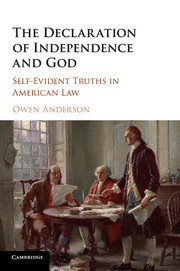Description
The Declaration of Independence and God
Self-Evident Truths in American Law
Author: Anderson Owen
This book studies the concept of a 'self-evident' God in American legal thought from the Revolution to the present.
Language: English
Subject for The Declaration of Independence and God:
Approximative price 32.87 €
In Print (Delivery period: 14 days).
Add to cart
The Declaration of Independence and God
Publication date: 03-2017
Support: Print on demand
Publication date: 03-2017
Support: Print on demand
Approximative price 111.60 €
In Print (Delivery period: 14 days).
Add to cart
The Declaration of Independence and God
Publication date: 09-2015
216 p. · 15.2x22.8 cm · Hardback
Publication date: 09-2015
216 p. · 15.2x22.8 cm · Hardback
Description
/li>Contents
/li>Biography
/li>
'Self-evident truths' was a profound concept used by the drafters of the American Declaration of Independence to insist on their rights and freedom from oppressive government. How did this Enlightenment notion of self-evident human rights come to be used in this historic document and what is its true meaning? In The Declaration of Independence and God, Owen Anderson traces the concept of a self-evident creator through America's legal history. Starting from the Declaration of Independence, Anderson considers both challenges to belief in God from thinkers like Thomas Paine and American Darwinists, as well as modifications to the concept of God by theologians like Charles Finney and Paul Tillich. Combining history, philosophy and law in a unique focus, this book opens exciting new avenues for the study of America's legal history.
Introduction; 1. Thomas Jefferson and Thomas Paine; 2. The reformed influence on common sense philosophy; 3. Common sense and self-evident in law; 4. Intuition and the self-evident in law; 5. Naturalism, Darwinism, the self-evident, and law; 6. Revivalism, new religious movements, and law; 7. Liberal theology and legal transformations; 8. Secular and religious goods in the twentieth century; Conclusion.
Owen Anderson is an Associate Professor of Philosophy and Religious Studies at Arizona State University. His books include The Natural Moral Law: The Good after Modernity (2013) and The Clarity of God's Existence (2008), which study the ethics of belief in God, how God can be known, and the knowledge of God as the highest good.
© 2024 LAVOISIER S.A.S.

